- 当前位置:
- 首页>
- 活动>
- ������������
������������
CCG持续关注国际关系议题,推动中国与全球化的发展,积极开展国际交流,充分发挥智库“二轨外交”作用,在巴黎和平论坛、达沃斯世界经济论坛、慕尼黑安全会议等重要国际政策与意见交流平台上组织分论坛、边会、圆桌会议、晚宴等活动,促进国际政商学界对话,凝聚共识;CCG积极与各国政界、智库界、工商界开展“二轨外交”活动,每年常态化赴多国调研与交流,促进中外关系攸关方互动,保持与多国政策圈层的沟通渠道。
-
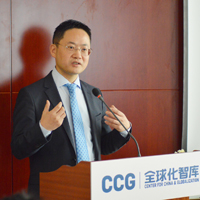
【China Daily】New forces transforming future of Chinese economy, says report
Liang Guoyong, an economic affairs officer from UNCTAD, discusses the report. [Photo provided to chinadaily.com.cn]Liang Guoyong, economic affairs officer at the Investment and Enterprise Division of United Nations Conference on Trade and Development (UNCTAD) and also a guest senior researcher from the Center for China and Globalization (CCG), released a report titled Global Change and Chinese Wisdom: 40th Anniversary of Chinese Reform and Opening-up: Review, Anticipation and Advice at CCG headquarters in Beijing on February 2. This report mainly analyzed the global significance of Chinese economic system and development mode, the global influence of Chinese economic transformation and upgrading and China’s key role in the globalization process and the reform of global governance system.The report indicated that China has accomplished an unprecedented development miracle through its reform and opening-up during the past four decades. “The success of China’s reform and opening-up mainly lies in finding a suitable path,” Liang Guoyong said. “Also, based on the past 40 years of reform and opening-up, we should emphasize the significance of foreign investment in the Chinese economy and the contribution of foreign capital to the Chinese economy.”The report also showed that new forces of transformation are shaping the future of Chinese economy, bringing about massive spillover effects across the world. Since the global financial crisis in 2008, China has gradually become one of the pillars of globalization, global economic governance and a worldwide economic recovery. Meanwhile, in the future, China will face the opportunities and challenges of deepening reform and opening-up, optimizing development models and upgrading economic transformation.Liang Guoyong proposed a “Growth Platform” suggesting that “slow growth, accelerated transformation, crisis averted and sustainable development” can be seen as the long-term strategic choices for China’s economic development. “The development of China’s economy should strive to realize the transition from emphasizing speed and quantity to emphasizing structure and quality in future,” he said.Xu Hongcai, professor and director of Information Department of China Center for International Economic Exchanges (CCIEE) and non-resident senior fellow of CCG, said that this report is meaningful for the 40th anniversary of the reform and opening-up and has implications for China’s development over the next 40 years and beyond. “It is of great significance for the outside world to understand China, eliminate prejudice and improve China’s soft power.”From China Daily, 2018-2-5
2018年2月6日 -
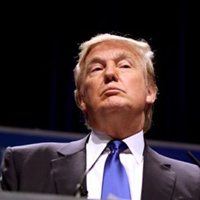
[People’s Daily] No trade war between China and the US in 2018, experts say
A trade war between China and the United States in 2018 is unlikely, despite US President Donald Trump naming China as a major economic rival in his first State of the Union Address, according to experts.“China has persistently exercised restraint on the trade front to lessen the possibility of a China-US trade war breaking out in 2018,” said He Ning, a former minister for trade and economic affairs at the Chinese embassy to the US, saying that he was “cautiously optimistic” about the bilateral relationship.Currently, the US is experiencing its largest economic recovery since World War II and secondary production including infrastructure construction is what Trump aims to focus on in the coming years, whereas the Chinese economy is currently being lifted by emerging industries such as big data, AI, and global logistic networks, Kang Yong, the chief economist of KPMG China, told a seminar held Wednesday by Center for China and Globalization in Beijing.The remarks came in response to Trump’s address on Jan. 30, when the US president said that his nation faces “rogue regimes, terrorist groups, and rivals like China and Russia that challenge our interests, our economy, and our values.”China-US trade is now closely dependent on both sides, according to Huo Jianguo, the former dean of the Chinese Academy of International Trade and Economic Cooperation. He considered the win-win cooperation in international trade will be embarked on the efficient dialogue with no conflict and confrontation.Based on the overarching message to balance the bilateral trade relationship, China aims to preserve export competitiveness and enhance the added value of export goods. The Chinese surplus with the US will either be reduced or remain as is, Huo said. “But China expects stability in the economic relationship,” he said.However, friction and disputes, mainly in form of non-tariff barriers, sustain an entrenched status in international trade, argued Shou Huisheng, a researcher at Tsinghua University’s National Strategy Institute. (by Wang Yuan)From People’s Daily, 2018-2-1
2018年2月5日 -
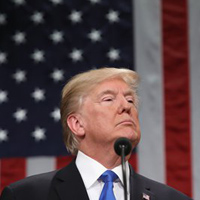
【Global Times】Trump speech accused of showing Cold War mentality
Trump speech attracts 8m hits on Sina WeiboUS President Donald Trump delivers the State of the Union address in the chamber of the US House of Representatives in Washington, DC on Tuesday. Photo: AFPThe US should not perceive China as a rival and should stop hyping the rhetoric to gain military and political mileage, experts warned following US President Donald Trump’s first State of the Union address."Around the world, we face rogue regimes, terrorist groups, and rivals like China and Russia that challenge our interests, our economy, and our values," Trump said in his speech before a joint session of Congress Tuesday night local time.It is alarming and provocative for Trump to call China a US rival again and especially to lump China together with rogue regimes and terrorist groups, Liu Yawei, director of the China Program of the Carter Center, told the Global Times.After unveiling the US national security strategy in December 2017, Trump also named Russia and China as "rival powers."Trump is using a negative sentiment toward China for more leverage in diplomatic relations, though he personally might not believe in it, Liu Weidong, a research fellow at the China Academy of Social Sciences’ Institute of American Studies, told the Global Times.However, the rhetoric was not what both countries expected, especially after the leaders of both countries had close contact, and the countries engaged in fruitful economic cooperation, Liu Yawei added."Since the Cold War, the US has been searching for a strategic rival but attempts by past administrations were derailed by other geopolitical tensions in the Middle East and East Europe … but based on recent reports and speeches, we see an increasingly clear strategy shift toward China," Teng Jianqun, director of the Department for American Studies at the China Institute of International Studies, said at a panel discussion at the Center for China and Globalization (CCG).The common interests far outweigh the disagreements with the US and cooperation is the only right choice for both sides, Chinese Foreign Ministry spokesperson Hua Chunying said at a daily briefing on Wednesday.China expects the US to drop the outdated Cold War and zero-sum game mentality and work for a shared goal with China, Hua said.Following the rival theory, Trump asked Congress to end the "dangerous defense sequester and fully fund our great military," and to modernize and rebuild the US nuclear arsenal.As the US is already the country with the highest military and defense budget, it will turn into an arms race, an unwanted development not only for China but for the world as well, Liu Yawei said.The US rivalry philosophy will only lead to losses on both sides, and will not be wise to turn it into a test of who can afford the most suffering, Liu added.It’s worth trying to understand why there’s growing concern and fear among Americans toward China when the two countries enjoy increasingly interdependent economic, trade and financial relations, he explained.Playing safeIn his 80-minute speech, Trump reaffirmed the "fair and reciprocal" trading relations without mentioning China or accusing Beijing of trade abuses.He also avoided asking China to "do more" when calling for a campaign of "maximum pressure" against North Korea.The shrewd president aims to leave some leeway for his policy toward China, and there’s no need to anger China in the speech that mainly targets the domestic audience, Liu Weidong said.The hashtag "about Trump’s address" attracted more than 8 million hits on China’s Sina Weibo platform as of press time.By Global Times,2018-1-31
2018年2月5日 -
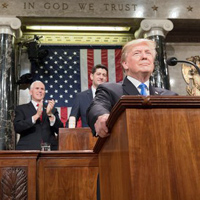
[中青在线] 特朗普首份国情咨文释放了哪些新信息
中青在线北京2月1日电(中国青年报·中青在线记者 陈小茹)当地时间1月30日晚,美国总统特朗普发布了就任后的首次国情咨文,内容涵盖特朗普政府过去一年内在内政外交、经济发展、基础设施、移民、社会改革等方面的工作重点,以展示一个他口中描述的以繁荣、重建和合作为特征的“新美国时刻”。 那么,这份国情咨文释放了哪些新信息?对美国政治、中美关系走向、朝鲜问题等热点问题有何影响?特朗普又透露了哪些新设想?1月31日下午,多名中美问题专家围绕这些问题提出了中国的应对之策。 将经济复苏归功于自己 在长达80分钟的演讲中,经济是特朗普演讲稿的最重要关键词之一。他列举了自己入主白宫一年来,在发展经济方面的一系列成绩,并将叙述的重点放在政府大规模的减税措施与创业就业方面。 关于减税方面,特朗普说:“自从我们通过减税政策以来,大约300万工人已经得到了减税的红利,其中很多工人都获得了数千美元。此外,新的税改将会使美国企业在海外具有竞争力。” 关于就业,特朗普表示,从大选日以来,美国已经创造了240万个新的就业岗位,其中仅是在制造业内就有20万个;美国失业人数达到45年来的最低点,工资开始重新上涨;美国股市屡创新高;美国小企业的信心在提升,已经处于历史最高水平…… 为了展示这两个经济成果,特朗普当天还特别邀请了俄亥俄州一家制造企业的企业主,宣称减税令让他们创下20年来的最好业绩,今年又新雇用了14名员工扩大业务。特朗普还专门提及苹果公司稍早前已宣布向美国投资3500亿美元并招聘2万员工。 对此,毕马威(中国)首席经济学家康勇博士1月31日在全球化智库(CCG)举办“从特朗普国情咨文看中美政治经济走向”研讨会上分析说,特朗普在演讲中把美国经济上的改善归功于自己,但事实是美国经济从2010年就已开始复苏,美国经济的复苏和世界经济的复苏是联动相关的。根据国际货币基金组织(IMF)发布的报告, 2010年以来全球经济同步复苏,其中120个国家2017年的经济增长速度比2016年快,这是近7年来首次出现。 对于特朗普在演讲中如此浓墨重彩地阐述经济成就,CCG高级研究员、中国原驻美公使何宁分析说,特朗普的国情咨文是基于美国国内政治的考虑,“这一年来他得到的评价反差较大,有高有低,很矛盾”。何宁认为特朗普上任第一年主要是解决国内政治的问题,特别是其2019年能否连任、年底中期选举等问题,“所以其国情咨文更多笔墨是讲国内的事,更多是给自己‘脸上贴金’,关于移民、税改讲了很多,但这主要是他赶上了经济增长的好时候。在贸易方面的问题并没有解决,也不能作为成绩,所以只简要提了几句”。 涉华措辞有重要变化 尽管特朗普在国情咨文演讲中一再重申“美国第一”,但在中国国际问题研究院美国研究所所长滕建群看来,特朗普的这份国情咨文可以用6个“第一”来概括,即美国第一、总统第一、中国(作为竞争对手)第一、少数族裔第一、中产阶级第一和企业第一。其中最重要的是中国第一这一部分。 在演讲中,特朗普延续《国家安全战略》报告和《国防战略》报告的说法,再次称中国、俄罗斯是美国的竞争对手,“把中国作为战略(竞争)对手意味着美国正在进行冷战以后最大一次的战略重心转移,” 滕建群指出这一对华政策措辞的重要变化应当引起重视。 在特朗普的论述中,中国对美国形成的挑战是全方面的,包括贸易领域、“一带一路”、国际治理体系、国际金融市场、人民币国际化和人民币崛起等方面。商务部国际贸易经济合作研究院原院长霍建国表示,美国绝对不会允许美元的地位受到任何挑战,但未来中美关系的主战场仍然是贸易领域。 对此,清华大学国家战略研究院研究员寿慧生指出,基于过去一年多的事态发展,中美经贸关系的未来走向已经非常明显:两国经贸关系会摩擦不断,突发性事件频发,而且呈常态化趋势。为此中国需要有足够心理准备和应对措施,不能被表面的友好外交蒙蔽。 霍建国则认为,应当看到当前中美两国摩擦加剧的同时双方合作的依赖性也在加强。他说:“现在不是美国第一,美国优先的问题,建制派当前关心的是要维护美国现在社会和当今世界的影响力和主导权的问题,因而美国不会退出当今全球经济治理,反而会适当加强或以不同的形式来维护这一切。”霍建国认为,中美核心还是要管控,在不冲突不对抗情况下实行有效的合作,不同层面的合作,不同层面的沟通都可能会发挥作用。 中国外交部发言人华春莹1月31日在例行记者会上对此回应称,中美拥有广泛而重要的共同利益,同时也存在一些分歧,但两国的共同利益远大于分歧。历史和现实都表明,合作是中美双方唯一正确的选择,共赢才能通向更好的未来。 华春莹强调,希望美方摒弃冷战思维和零和博弈的过时观念,正确看待中国和中美关系,同中方相向而行,相互尊重,聚焦合作管控分歧,维护中美关系健康稳定发展。 美对朝核能力的判断已改变 在谈及国家安全方面,特朗普不改大嘴本性,再次“炮轰”朝鲜。他警告说朝鲜可能“很快”就有能力对美国构成威胁,美国不能对朝鲜做出让步,将持续对朝鲜施加最大压力,以防止朝鲜攻击美国的事件发生。 特朗普说:“过去的经验告诉我们,自满和让步只会招致侵略和挑衅。我不会重蹈过去政府的覆辙,不会再让我们陷入这个危险的境地。” 令人关注的是,特朗普政府2月1日突然宣布撤销对韩裔美国教授车维德出任美国驻韩国大使的提名。韩国《中央日报》对此解读称,车维德的提名已获得韩国政府的同意,但美国却破例撤销了其提名,这相当于向外界发出了特朗普政府对朝政策将趋于强硬的危险信号。这是因为车维德之前曾反对美国在不发生全面战争的前提下,以压倒性军事力量对朝鲜施加限制性的“鼻血打击”。 对于特朗普在国情咨文重点提及的“朝鲜对美国领土的威胁”,滕建群分析说:“可以看出,美国对朝鲜核能力的判断已发生了本质的变化,这是因为朝鲜现在已经初步具备了能够危及美国本土的能力,这个是对美国最大的威胁。”文章选自中青在线,2018年2月1日
2018年2月5日 -
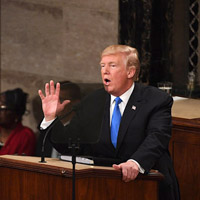
【中国日报网】专家:特朗普首次国情咨文演讲可圈可点
当地时间1月30日,美国总统特朗普在华盛顿国会山发表其执政以来的首次国情咨文演讲。(图片来源:新华社) 中国日报网北京1月31日电(记者 严玉洁) 当地时间1月30日晚,美国总统特朗普在国会发表上任以来的首次国情咨文演讲。专家指出,特朗普的表现可圈可点。 CCG特邀高级研究员、中国国际问题研究院美国所所长滕建群说,特朗普的演讲可圈可点,他现在整个风格都在向建制派靠拢,说话做事跟刚上任时大相径庭。在他看来,特朗普的演讲中主要强调了“美国第一”、“总统第一”、“少数族裔第一”、“中产阶级第一”、“企业第一”等。 CCG特邀高级研究员、清华大学国家战略研究院研究员寿慧生也持类似观点。他表示,特朗普此次演讲走的是四平八稳的路线。这对他而言是一个向全国阐述自己的政治主张的机会,更重要的是他可以借此告诉大家他做得有多成功。事实上,国情咨文演讲基本不会影响人们对总统的印象,支持者还是支持,反对者依然反对。 毕马威(KPMG)中国首席经济学家康勇则认为,特朗普有些夸大了自己的功劳。虽然特朗普执政期间美国失业率显著下降,但这一趋势其实从2010年10月就开始了,到现在已经将近8年了。在股市上涨这个问题上也是一样,虽然这和美国经济增长分不开,但也还是有其他因素的推动。 CCG高级研究员、原中国驻美公使何宁表示,在执政过程中,特朗普的商人性格一次次显现出来,他喜欢把压力推给对方。如果后者让步,他自然乐见其成;但如果后者不肯退缩,他也还是会按照原来的边界办事。 CCG特邀高级研究员、商务部国际贸易经济合作研究院原院长霍建国也赞同这一观点。他说,特朗普不会愿意把关系搞僵,因为这样的话自己也会一无所获;只有维持住关系,才能逐步获利,进而实现他的“美国第一”。 另据报道,在30日晚的演讲中,特朗普主要提及了就业、减税、药价、贸易、基础设施、移民、反恐等问题。文章选自中国日报网,2018年1月31日
2018年2月5日 -
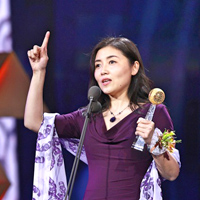
【南方周末】人才环流,海归再“归海”
原清华大学教授颜宁已于2017年秋季加盟美国普林斯顿大学。(视觉中国/图)现在,为了在国外任教专门先去读博士的例子已经很少了。“(在国外)拿不到好位置的话也不会出国,现在国内教育水平和国外的差距没那么大了。”为什么颜宁等人走出去这一未成规模的现象会引来这么多不满的声音:“里面是不是有很多青年知识分子?为什么他们借颜宁这个事儿来吐槽?”“以前有颜宁这样海外培养的,未来会看到国内培养的(学者),到国外一流大学当教授,我觉得这都是正常现象。”刚过去的2017年,一批在学界颇有名气的海归教授决定再度“归海”。原清华大学教授颜宁已于2017年秋季加盟美国普林斯顿大学,原上海科技大学教授马毅随后于2018年1月入职加州大学伯克利分校,“80后”的北京大学教授许晨阳也在2017年做出决定,将于2018年秋季加盟麻省理工学院……已在美国生活近二十年的奥克兰大学副教授王跃建,将他们的再度“归海”看作一种新现象:“十年前、二十年前,国内的教授来美国做大学教授,特别是一流大学教授,那是不可思议的。现在慢慢就会正常了,(公众)也会慢慢接受人才的流动。”颜宁本人也对媒体表示:“改革开放以来,有大批的留学生出国,是做学生。现在终于看到了一批人被请回去,而且是到顶尖的学校当先生。这是很多老一辈科学家的梦想。”原上海科技大学教授马毅于2018年1月入职加州大学伯克利分校。(马毅微博截图/图)缘何再“归海”?“70后”的颜宁本科毕业于清华大学生物系,后赴美国普林斯顿大学深造,30岁即回到清华当教授,成为清华当时最年轻的博士生导师。这次“归海”,距离她2007年从普林斯顿博士后回到清华做教授,恰好十年。颜宁受聘普林斯顿大学分子生物学系雪莉·蒂尔曼终身讲席教授的消息传出时,这个选择一度被解读为“负气出走”。“很多人有各种议论、猜测,甚至觉得这件事有一点悲情,认为我是被挤压走的。其实真的不是。” 2017年12月15日,颜宁在一个颁奖典礼上公开回应称,去普林斯顿大学是“自讨苦吃”:“我在清华这个我最爱的母校待得太舒服了,想换一个环境重新挑战自己。”此前工作单位与颜宁所在的清华只有一路之隔的许晨阳,则这样解释他再次“归海”的理由:“想趁这个机会去世界顶尖的地方看一看。”许晨阳生于1981年,本科和硕士研究生都毕业于北京大学,获普林斯顿大学博士学位后在美任教,2012年回到北大任职。作出加盟美国麻省理工学院的决定后,他在接受澎湃新闻采访时说“现在去了也不代表我将来就不回”。许晨阳表示:“不管我走到哪里,我做出来的工作,别人都会将其定为一个中国数学家做出来的工作。”刚刚于1月初入职美国加州大学伯克利分校的马毅则对南方周末记者说:“我想其他老师情况与我不一样,而且各有其个人缘由,媒体不要过多解读。”马毅从清华大学本科毕业后,赴加州大学伯克利分校求学,毕业后留美任教,2014年全职加入上海科技大学。他不愿多谈回到加州大学伯克利分校的原因:“我本是美国UIUC大学(伊利诺伊大学厄巴纳-香槟分校)的教授。与家人分离了几年,回国帮助上科大建校和建设信息学院。如今学院初具规模,我可以回到母校专心科研,并且与家人团聚。”海归教授再“归海”现象,引起了一些研究机构的注意,中国人才研究会副会长、国务院参事王辉耀担任理事长的全球化智库(CCG),在2016年12月发布了《中国留学发展报告(2016)No.5》。该报告已由社会科学文献出版社公开出版,报告指出,长时间的海外求学经历使得学者原有在国内的关系淡化,一定程度上使他们回国后面临社会关系网络支撑薄弱的问题。对于几位教授的再次“归海”,中南大学教授喻海良看到了问题的另一面:“高校教师出国谋教职比以前更容易了。”喻海良曾执教于澳大利亚伍伦贡大学,十几年前,他身边有好几位教授为了得到澳大利亚大学里的工作机会,不得不在澳大利亚重新读博士学位,或先做访问学者。而现在,为了在国外任教专门先去读博士的例子已经很少了。“(在国外)拿不到好位置的话也不会出国,现在国内教育水平和国外的差距没那么大了。”喻海良告诉南方周末记者。美国普林斯顿大学教授琚诒光也觉得,教授再“归海”反映出中国科研水平的提高,“以前有颜宁这样海外培养的,未来会看到国内培养的(学者),到国外一流大学当教授,我觉得这都是正常现象。”琚诒光早年留学日本,2001年从清华大学长江特聘教授“跳槽”到普林斯顿大学时,先从助理教授做起,如今是普林斯顿大学机械航空系罗伯特·帕特森讲席教授。刚开始不适应一年多以前,颜宁到普林斯顿大学面试教职时,琚诒光就已得到消息。新同事颜宁的到来让琚诒光回想起17年前他的选择,当时他从日本东北大学回到母校清华才执教半年,一次去美国开会,正好普林斯顿大学有个助理教授的岗位开放申请,他们就主动问琚诒光要不要试一试。“我说我不要,我在中国的工作很好。”琚诒光婉拒了对方。但美方还是劝说他做一下答辩,“他们说给了offer也可以拒绝。”于是琚诒光借了一套西服,去普林斯顿做了一场学术报告,然后就回国了。一个月后,琚诒光收到普林斯顿大学机械航空系主任的邮件,问他想要什么样的工资,什么样的实验室,希望尽快给答复。当时,他真没想接受这个offer。最终因为一件偶发的事情改变了想法。初到美国时,琚诒光很不适应。“亚洲人都很客气,什么都给你安排好了。到了美国,什么都是靠自己,没有人去接你,没有人告诉你怎么做。”琚诒光说,首先申请科研经费就是个难题。在中国,每逢有科研经费项目发布,学校总会通知教师,而美国则需要教师自己上网搜集信息。另一个难题是语言不通。当时琚诒光的英语水平可以正常上课,但经常听不懂学生的问题,尤其是专业以外的事情,甚至有学生因此质疑“为什么要招这样的教授”。“看到学生的评价,我压力也很大。但是美国之所以能吸引那么多人来,就是它有包容性,是看你的未来,而不是现在。”琚诒光找到系主任反映学生的评价,系主任安慰他说没关系:“系里的教授一大半都是国外来的,每个人都有自己的口音,过几年就好了。”适应以后,琚诒光很享受在美国大学任教的生活。虽然年轻教师要取得终身教授也不容易,压力也很大,但能否成功主要取决于同行的专业评价,“关系是次要的事情”。十多年过来,琚诒光最推崇的就是美国大学里这种简单的人际关系。工作上杂事很少,大部分时间都花在科研和教学上。周末大部分时间都在家里,和家人在一起,基本上下午六点以后就没有什么电话打进来。他也跟学生说,平日下午五点以后和周末不会给他们打电话,如果接到他的电话了,只有两件事情,或是状况紧急,或是要请学生吃饭。“在美国,学术环境整体上也更自由和宽松。”美国田纳西大学教授程宗明目前也在中国的母校南京农业大学兼职,比较之后得出了这样的结论。程宗明告诉南方周末记者,他在国外有个感受是“你想做什么样的科研基本就可以做,你想找什么样的合作就能找什么样的合作,没有什么人来限制你,不用担心人家会把你的想法给偷走”。而在国内时,程宗明感觉学术思想上的碰撞比较少。他将在美国的学术合作比喻成“东北乱炖”,“大家都把自己的东西整合到一块儿去做。”而国内的项目合作,更像是“冷盘菜”,每个人带一点东西来,往桌子上一放,申请项目时把一整张桌子都端过去,“你看我这里什么东西都有,但是最后其实没有真正的合作。”“(颜宁)他们‘归海’后也许可能会有更多的合作、更多的交流、更多的思想碰撞,让他们的学术水平有进一步的提高。”程宗明感慨。“持开放和乐见其成的态度”谈及高校海归教师再度“归海”,国务院参事、全球化智库(CCG)理事长王辉耀向南方周末记者重复了四五遍:“这事很正常。”“没有反而不正常。中国老师到了别的国家一个都不吃香,到国际上去都不被承认,反而不是个好事。但走多了就不好,多了就是说明我们人才流失。”王辉耀说,现在还没有数据支持海归教授再“归海”已成趋势,只是个例。“但有一两件这种事儿,就说明进入人才环流的时代了。”“环流”还体现在一些外国老师也开始到中国长期任教。颜宁的母校清华大学就从2001年开始实施了“讲席教授制度”,在世界范围内公开招聘著名学者。2006年国家外国专家局和教育部联合推出了“高等学校学科创新引智基地”建设计划时,清华大学有信息、环境和数学三个学科的项目入选,就聘请了美国、法国的科学院院士挂帅,吸纳了二十多位高水平外籍教授学者担任骨干。对于此次颜宁再次归海,2017年5月9日,清华大学相关负责人接受澎湃新闻采访时就表示,清华大学对此保持开放、乐观和积极的态度,相信这在一定程度上反映了我国高等教育发展进入了新阶段,有助于将中国的学术思想、教育理念和清华的学术风格传播到国际学术舞台上。该负责人还提到,在普林斯顿大学的聘期内,颜宁将继续从事高水平学术研究和人才培养工作,也会保持与清华的联系,促进两校和中美两国间学术交流与合作。美国奥克兰大学副教授王跃建则判断,会有越来越多的中国教授到欧美一流大学任教,但在短期内还不会成规模。而且和每年大量海归相比,再“归海”教师的相对数量非常少。“没有必要如临大敌,没有必要草木皆兵。”上海交通大学科学史与科学文化研究院教授李侠同样认为,“颜宁现象”只是开始,未来会有越来越多的高端人才流出去,但谈不上是人才流失。只要人才流入大于流出,人才蓄水池就会形成。“我们当然希望杰出的科学家在中国练就‘武功’后,能够继续在中国发挥作用。”九三学社中央委员、北京交通大学教授王元丰说,他也希望中国有宽广的胸怀,对于中国科学家到国际科研机构任职,持开放和乐见其成的态度。相比教授再“归海”,王元丰更关心的是,为什么颜宁等人走出去这一未成规模的现象会引来这么多不满的声音:“里面是不是有很多青年知识分子?为什么他们借颜宁这个事儿来吐槽?”在上海交大教授李侠看来,最近人才流出的个例也暴露了学术界的一些老问题,比如单纯靠金钱的投入来吸引人才,缺少对人才高级需求的满足。他告诉南方周末记者,颜宁的做法不仅仅为科学家们的职业规划提供了有说服力的样本,而且通过这些个案,也可以发现高端人才内在偏好排序的变化,这也为未来人才政策的改革提供了一条可靠的切入路径。普林斯顿大学给颜宁开出的条件是终身讲席教授,在美国的教授序列中,这是最高级的。“这个条件的针对性非常强。”李侠用马斯洛需求层次理论来分析,普林斯顿大学聘请颜宁,首先为个体提供了归属感,而授予讲席教授,相当于在世界学术界对她个人能力的再次承认,是对人才的充分尊重。反观国内的人才引进政策,李侠认为,仍然停留在需求偏好的较低端层面,还是粗放型的,“给你钱、资源,甚至许诺一个你需要的头衔,然后你就要在规定的时间内提供我们需要的产出。”“这种模式成本巨大,无法持续,更为关键的是它缺少对人才高级需求的满足,从而无法引来最高端的人才以及最衷心的激情投入。”李侠呼吁,要把国内科研环境建设好,要尊重人本身。文章选自《南方周末》,2018年2月2日
2018年2月5日 -
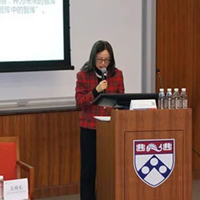
[China.org.cn] Global think tanks ranked at Beijing symposium
"The sounds of winds, rains and recitations are in no ways escaping my ear and the family, state and earthly affairs have never failed to draw my concern."He Yuping, the general manager of the Penn Wharton China Center, addresses the symposium held for the release of think tank indexes initiated by Think Tanks and Civil Societies Program at the University of Pennsylvania, on Jan. 30 in Beijing. [Photo by Wu Jin / China.org.cn]This tenet, written by Gu Xiancheng, an ancient Chinese scholar at Donglin Academy, became an aspirational guideline among the intellectuals who had to put up with a corruption-riddled society and face a falling Ming Dynasty (1368-1644).The academy, established in 1111 by famous Confucian philosophers Cheng Hao and Cheng Yi, fell apart only 18 years later. After studying his predecessors’ ideas and vision, Gu revived the academy a few decades before the collapse of the decadent Ming.According to Emanuel Yi Pastreich, director of the Asia Institute and an American Sinologist, the Donglin Academy served as a prototype for contemporary Chinese think tanks, hundreds of years before the founding of many American think tanks at the end of World War II.Pastreich made his remarks on Jan. 30 at a symposium held in Beijing. As part of the global release of the 11th edition of the "Go to Global Think Tank Index," involving the efforts of the Think Tanks and Civil Societies Program (TTCSP) at the University of Pennsylvania, the symposium briefed the audience on the ranking of think tanks worldwide and was followed by a panel discussion on why think tanks matter.The panel discussion on why think tanks matter is held with the release of the think tank indexes initiated by Think Tanks and Civil Societies Program at the University of Pennsylvania, on Jan. 30 in Beijing. [Photo by Wu Jin / China.org.cn]According to the ranking, the Brookings Institution (United States), the French Institute of International Relations (France) and the Carnegie Endowment for International Peace (United States) were the top three think tanks around the world in terms of comprehensive research competence and influence.The China Institutes of Contemporary International Relations, ranked 29th, was the leading Chinese think tank, followed by the Chinese Academy of Social Sciences, which secured the 38th position on the top 100 list."The annual ranking is dedicated to improving the research capabilities of the think tanks while they are serving for policy makers in national, regional and theoretic dimensions," said He Yuping, general manager of the Penn Wharton China Center.During the symposium, TTCSP Director James G. McGann addressed the audience via video, saying he is grateful to partners around the world for the whole scene program, which helped make the global community of think tanks a reality.The history of modern think tanks goes back to the end of WWII in the United States, when the Carnegie Endowment for International Peace played a pivotal role in passage of the 1948 U.N. Genocide Convention and the Brookings Institution put forward recommendations which helped shape the Marshall Plan.In recent years, think tanks have been mushrooming in different countries with varying commitments. In Mexico, the think tank Ethos created a comic strip to highlight for younger generations the prevalent corruption that has affected the country.In Africa, the think tank ACCORD, which became the first African NGO in history to address the U.N. Security Council, has played an integral role in conflict resolution and peacemaking activities across the continent.During the outbreak of Ebola in 2014, the Institute of Development Studies from the U.K. led the development of the Ebola Response Anthropology Platform and was later rewarded with the Economic and Social Research Council’s Outstanding International Impact Prize for its rapid and effective response during the epidemic."Over 160 organizations in about 100 cities around the world join in together to host locally produced programs that is to explore why think tank matters," said McGann. "I believe they are critically important.""But to remain relative and competitive, they need to adapt and transform their strategies, structures and operations, providing innovative and excellent ideas to remain the central mission of think tanks," he added.According to He, the world today is facing a host of serious crises, such as shortages of water and food as well as the many war-torn regions of the globe.Moreover, He said, the rise of populism against globalization has introduced huge uncertainty for the future.In dealing with these challenges, the voices of credible organizations count.According to Ding Yifan, senior research fellow at the National Strategy Institute at Tsinghua University, these outbreaks of populism may bring people to realize the importance of think tanks.His idea was echoed by Fang Jin, deputy secretary general of the China Development Research Foundation, saying that think tanks should be valued for their professionalism, neither flattering nor following suit, at a time when superficial and dubious reporting is supposedly sweeping across social media.In this challenging media environment, people who are bewildered by the rumors of distorted news in cyberspace are searching for truth, so they have begun looking to prestigious media outlets, Fang said.According to Liu Qian, managing director of the Greater China region at The Economist Group, the magazine’s content subscriptions are estimated to grow by 30 percent amid these mounting uncertainties and challenges.A book named the "Global Think Tanks," jointly written by Miao Lu, the deputy director and secretary-general of the Center for China and Globalization (CCG), a Beijing-based think tank, and Wang Yaohui, chairman of the CCG, was released during the symposium.Wang Huiyao, Chairman of the Center for China and Globalization (CCG), addresses the symposium for the launch of the book "Global Think Tanks," jointly written by Wang and Miao Lu, the deputy director and secretary-general of CCG, on Jan. 30 in Beijing. [Photo by Wu Jin / China.org.cn]From China.org.cn,2018-2-1
2018年2月5日